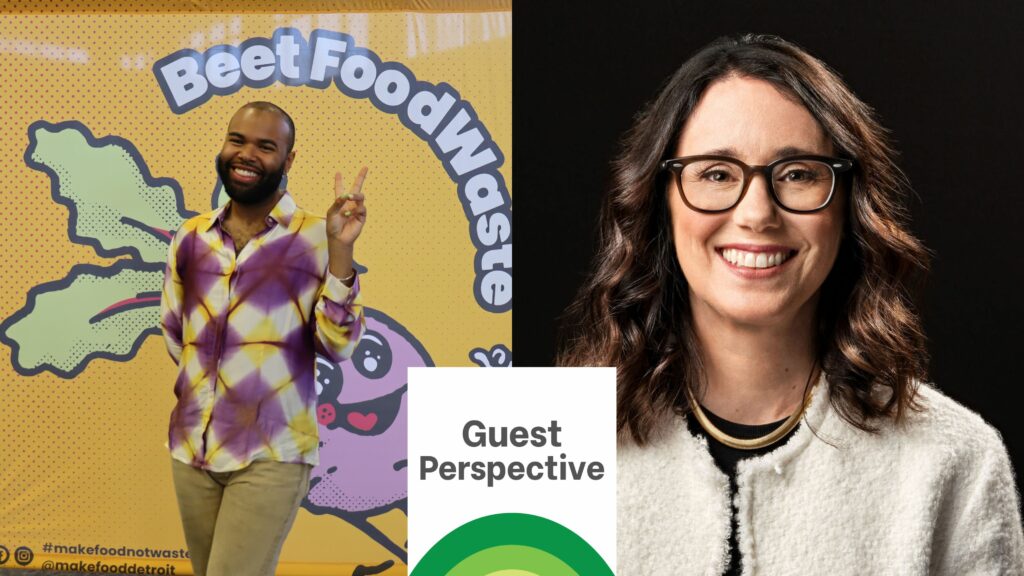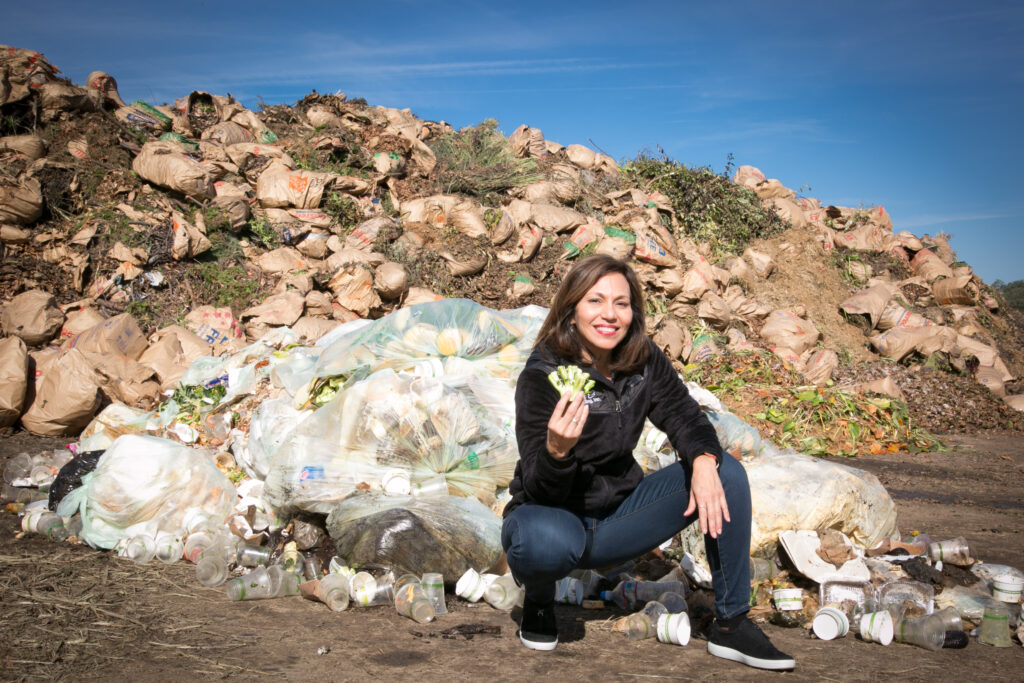Perspective on Eliminating Food Waste

DANIELLE TODD, IS THE EXECUTIVE DIRECTOR OF MAKE FOOD NOT WASTE Landfilled food is one of the primary sources of climate change due to two main reasons. First, food decomposing in landfills emits methane, a greenhouse gas 25 times more potent than carbon dioxide. Second, landfilled food represents a waste of land, water, and transportation resources that cannot be reclaimed. Given the substantial volume of food we send to landfills, methane emissions are skyrocketing and our resources are depleting at an alarming rate. Annually, Michiganders discard more than 2 billion pounds of food, resulting in approximately one-third of our landfills being composed of food waste. This excessive waste leads to the negative impacts of extreme weather such as flooding and power outages. It deteriorates air quality, threatens our food supply, and endangers vital plants and animals. Consequently, the State of Michigan, along with the U.S. government and the United Nations, has set a target to halve food waste by 2030. However, with 2 billion pounds of food still being landfilled annually, achieving this goal within six years presents a major challenge. Despite the fact that the problem is so great, eliminating food waste from our landfills is not all that difficult compared to other climate-related changes we need to make. Yes, it’s something we all must do, but it’s also something we all can do. According to the United Nations, more than half of the food waste comes from our homes. That means all of us can make a huge difference in this issue by changing how we handle food in our kitchens. For a fun way to get started, join our 7 Day Food Waste Challenge. You’ll learn the basics and begin to set up some habits that will drive down the amount of food you throw away. Of course, food waste happens outside of homes too. And if we’re going to reach the State’s goal in less than six years, we need a concerted plan. That’s why Make Food Not Waste has launched The 2030 Project, focusing on Southeast Michigan, the region with the highest population density. Concentrating efforts in this area is strategic, given that a larger population corresponds to greater amounts of waste. The project’s objective is to divert all food waste from landfills in the top 15 cities in the region. By collaborating with 17 local and national partners, Make Food Not Waste is crafting a detailed plan incorporating best practices in food waste reduction from across the country. The project’s approach underscores two critical principles: first, there is no singular solution to food waste. Second, we can only stop food waste by working together. While skeptics may argue that completely eliminating food waste from landfills is unattainable, we feel otherwise. It does not require the invention of groundbreaking technology or a defiance of natural laws. Rather, we simply need to stop throwing our food in the garbage. While establishing infrastructure, logistical frameworks, and educational programs pose challenges, they are not insurmountable. The alternative—continuing to waste our resources and make our planet hotter – is not something we can live with. Learn more at www.makefoodnotwaste.org. Be sure to subscribe to our newsletter for regular updates on sustainable business practices in and around Detroit.
Unlimited Recycling – 25 Years and Still Evolving

In 1999, Maria Marin tapped into her passion for “doing the right thing for Mother Earth” and started Unlimited Recycling Inc. Today, the company offers total recycling and waste management to companies and individuals nationally with the goal of going global. SBN Detroit sat down with Marin to hear about how her recycling services – and clients – have evolved over the years. Q: Tell me about Unlimited Recycling A: Unlimited Recycling is a comprehensive total waste management company offering one-stop-shop services for any type of waste stream. Our services include transportation of any waste or recycling material, equipment rental, including dumpsters of any size, compactors, balers, and any type of container to properly store and transport material. In addition, we offer reporting, training, and education. To date, we’ve handled millions of pounds of waste. Q: What prompted you to start the company in 1999? A: I worked for the Department of Natural Resources, and we received many calls on illegal dumping in waterways and even backyards. When I became pregnant with my first son – who is now the VP of the business – I was told not to eat the fish out of the Great Lakes due to mercury levels. I was so disturbed by that and felt I needed to do something about this problem. I also had the desire to be independent and have my own business. The opportunity presented itself when I lost a job and was looking for next steps. I decided it was time and that I could start my company and shape it any way I liked. The opportunities were limitless, so I named it Unlimited Recycling. We started with universal waste such as fluorescent lamps, batteries, electronic equipment, etc. Eventually, customers started asking about other waste streams, including industrial waste and gradually adding more services. Q: How did your business evolve? A: In 2008, I had the opportunity for an Army contract – they wanted solid waste management for recycling and trash. This would require trucks and dumpsters in an industry I did not know anything about. It took three months for me to learn the business, and the contract was awarded two months later. I purchased my first roll-off truck and 13 dumpsters. Our fleet and equipment have grown tremendously since then. Facilities and companies want one vendor to oversee all their recycling and waste management needs, so we have taken this on by managing these companies’ vendors, contracts, billing, dispatching, and purchasing. We went national about three years ago. Q: How have things changed over the years with the recent government mandates and focus on greenhouse gas emissions and sustainability overall? A: It has been very refreshing to see that the State of Michigan and the governor are on board. Last year, Michigan set new policies to increase the state’s 19% recycling rate to 29% by 2029 and organic waste to 45% material recovery by the year 2050. I believe these goals could be achieved much sooner. To do this, we need to spread awareness within our personal and professional communities. We are working with companies such as Walbridge, managing LEED disposal management for the Gordie Howe International Bridge U.S. Port of Entry, Selfridge Air National Guard Base waste and recycling for the last 22 years, and total waste management for Android Industries, Magna, and many other automotive suppliers. When I started the business, people thought I was crazy. Now I don’t have to sell the why. We have people calling us every day. It’s still a challenge, but every day awareness increases more for the need to recycle. Q: You mentioned you also train companies in recycling. What does that look like? A: Yes. Many people still don’t know how to properly recycle and also find it daunting. I go into businesses and implement their recycling program according to their needs. Often, we start with single-stream recycling for offices and train them on acceptable items and materials, containers needed, etc. Many people do not realize that if you put one waste material that doesn’t belong in a recycling bin, it will contaminate the load. Also, there is a misconception that recycling is expensive. We’ll do a cost analysis for companies and show them that being sustainable is not only the right thing to do, it can also be economical. We’ve saved companies thousands of dollars from diverting cardboard alone. Q: Have the needs of your clients changed a lot through the years? A: Yes. Many started with one service and now we are handling all of it. I’ve seen many companies grow in their efforts over the years. They are becoming more environmentally aware, and their corporate offices are setting higher standards for sustainability, so we get requests all the time from current customers asking if we can recycle new additional waste streams for them or find a solution for a waste stream that isn’t commonly known to be recyclable. I think our services and creative solutions help us retain our customers and find new ones through recommendations regularly. I think that credit goes to our amazing team that responds quickly to customer requests and needs. Q: You offer dumpster rental, universal waste recycling, industrial waste recycling, food waste composting, and LEED waste management. What services do companies and institutions use the most? A: All of the above every day! We are getting more and more requests lately for LEED. (Leadership in Energy and Environmental Design). Q: What does your future look like? A: Our goal is to increase our total waste management services to help companies reach their sustainability and zero-waste landfill goals. We started here in Detroit and are now nationwide; however, it has always been in the plan to go global. I want to go back to my roots, to South and Central America, to teach Latin communities how to recycle, providing them with education and resources. I was recently invited to travel to Africa to assist the country with its plan to implement


